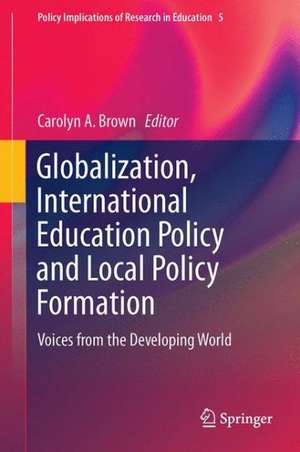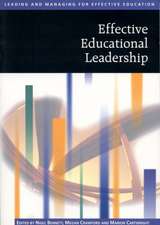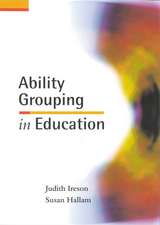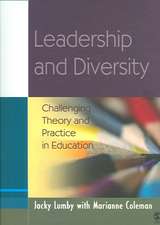Globalization, International Education Policy and Local Policy Formation: Voices from the Developing World: Policy Implications of Research in Education, cartea 5
Editat de Carolyn A. Brownen Limba Engleză Hardback – 28 oct 2014
| Toate formatele și edițiile | Preț | Express |
|---|---|---|
| Paperback (1) | 639.25 lei 43-57 zile | |
| SPRINGER NETHERLANDS – 23 aug 2016 | 639.25 lei 43-57 zile | |
| Hardback (1) | 645.47 lei 43-57 zile | |
| SPRINGER NETHERLANDS – 28 oct 2014 | 645.47 lei 43-57 zile |
Preț: 645.47 lei
Preț vechi: 759.37 lei
-15% Nou
Puncte Express: 968
Preț estimativ în valută:
123.51€ • 129.28$ • 102.80£
123.51€ • 129.28$ • 102.80£
Carte tipărită la comandă
Livrare economică 31 martie-14 aprilie
Preluare comenzi: 021 569.72.76
Specificații
ISBN-13: 9789400741645
ISBN-10: 9400741642
Pagini: 210
Ilustrații: XVIII, 254 p. 2 illus. in color.
Dimensiuni: 155 x 235 x 19 mm
Greutate: 0.56 kg
Ediția:2015
Editura: SPRINGER NETHERLANDS
Colecția Springer
Seria Policy Implications of Research in Education
Locul publicării:Dordrecht, Netherlands
ISBN-10: 9400741642
Pagini: 210
Ilustrații: XVIII, 254 p. 2 illus. in color.
Dimensiuni: 155 x 235 x 19 mm
Greutate: 0.56 kg
Ediția:2015
Editura: SPRINGER NETHERLANDS
Colecția Springer
Seria Policy Implications of Research in Education
Locul publicării:Dordrecht, Netherlands
Public țintă
ResearchCuprins
Chapter 1 Giving Voice to Local Scholars in Educational Policy, Carolyn A. Brown.- Part I - Historical Background and Current Status of International Donor Policy in Education.- Chapter 2 A Brief History of International Education Policy: From Breton-Woods to the Paris Declaration, James H. Williams.- Chapter 3 Current Trends in Education & Development, James H. Williams, Carolyn A.Brown and Sarah Kwan.- Part II - Voices from the Developing World.- Chapter 4 Differential Support, Divergent Success: Three Case Studies of International Influence on Education Policy in El Salvador, D. Brent Edwards Jr., Pauline Martin and Julián Antonio Victoria Libreros.- Chapter 5 Education for all and the Global-Local Interface: A Case Study of The Gambia, Matarr Baldeh and Caroline Manion.- Chapter 6 Nordic aid and the Education Sector in Africa: The Case of Tanzania, Zehlia Babaci-Wilhite, Macleans A. Geo-JaJa and Mwajuma Vuzo.- Chapter 7 Quality with equity in primary education: Implications of high stakes assessments on teacher practice in Bangladesh, Jaddon Park and Manzoor Ahmed.- Chapter 8 No Nation is an Island: Navigating the Troubled Waters Between Indigenous Values and Donor Desire in the Republic of the Marshall Islands, Paul Robert Sauer.- Chapter 9 Education and Gender Rights in Latin America, Ezequiel Gomez Caride.- Chapter 10 Where to From Here? Analysis of Cambodia's 2009-2013 Information Communication Technologies in Education Plan, Jayson W. Richardson, John B. Nash, Lyda Chea and Chivoin Peou.- Chapter 11 International Aid Influences on South African Policy Development in Education and Training, Peliwe Lolwana.- Chapter 12 A View from Latin America: Two Generations of Reforms on Higher Education; Towards a New Decade of Collaboration, Jorge Uribe-Roldán.- Chapter 13 Global and Local: Standardized Testing and Corruption inAdmissions to Ukrainian Universities, Ararat L. Osipian.- Part III - Toward a Theory of Collaboration.- Chapter 14 Can There be Real Collaboration Between Donors and Developing Countries in Educational Policy? Conclusions and Recommendations, Carolyn A. Brown.
Textul de pe ultima copertă
This volume examines how international donor policy and funding affect local educational policy formation in developing countries and regions. Consisting of research and commentary on primary, secondary and tertiary education by scholars from developing countries around the world, it represents a seldom-heard voice. The viewpoints offered here are surprisingly varied and refreshingly divergent from much of the usual Western discourse on international educational policy formation and implementation. Starting out with an overview of the history and current condition of international donor policy, the book leaves ample room for voices from the developing world in its ten chapters that make up the second part. It concludes with a tentative discussion of theory of collaboration. The volume contributes to the global attempts at collaboration between donor and recipient countries as it presents a perspective not often heard in the clamour of voices of Western experts and local government officials.
Caracteristici
Lets scholars from developing countries speak for themselves and their country Offers an alternative perspective on international educational policy formation Presents a unique argument for donor/recipient collaboration in international education policy Offers a concise, yet complete, overview of the history and condition of international educational policy Includes supplementary material: sn.pub/extras

























